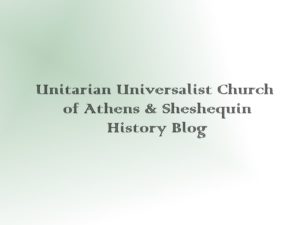Before the Unitarians and Universalists joined together in 1961, many states had Universalist Conventions. Like today’s Unitarian Universalist Association and the affiliated Regional organizations, these conventions existed to support the Universalist churches in their states and to promote the spread of the good news of universal salvation. Some of the Conventions – including Pennsylvania’s and New York’s – are still active today. The current member churches of the Pennsylvania Universalist Convention (PUC) are the seven Pennsylvania UU churches that were originally Universalist: Athens/Sheshequin, Berks County (Reading), Brooklyn (PA), Girard, Restoration (Philadelphia), Smithton, and Towanda.
The PUC was organized in 1832 and held its first meeting in Columbia, Lancaster county, on May 30th and 31st of that year. There was not yet a Universalist society in Columbia, but there were quite a few citizens who were believers. Lacking a church building in which to hold their meeting and worship services – there were usually at least five services at a two-day meeting – the Convention hosts requested the use of the Town Hall. A petition was presented to the Columbia officials, which read:
“To the Town council of the Borough of Columbia: The petition of the subscribers, inhabitants of the said Borough, who, though not organized as a religious denomination, believe that Christ died for all men and that there will be a final restitution of all things to a state of purity and happiness, but who are destitute of a place of worship, and therefore are willing to pay the said Borough the sum of five dollars per day, for the use of the Town Hall, for two days, for the performance of religious duties and other business pertaining to the society called Universalists. We therefore, most earnestly request, that the Town Hall be granted for the above named purpose.”
The petition was signed by “eighty respectable taxable citizens of Columbia.”
Remember that, in the early 1800’s, “hell fire and damnation” was the dominant Christian doctrine. Universalists were regarded as heretics who, fearing no punishment in the afterlife, would blithely engage in all sorts of immoral and sinful behavior.
The Town Council of Columbia denied the request to use the town hall. Undeterred, the hosts secured a small school house in which to hold the meeting. During worship on the first night, several young men threw stones at the building. In his summary of the meeting, the Clerk wrote:
“…The most perfect harmony prevailed in all the deliberations of the [Convention], and the best attention was paid to the preached word. And we doubt not, but great good will arise from this meeting. We feel the more confident of this, in consequence of the course pursued by our religious enemies. Their withholding the town hall was contrary to the established customs of the place; and their stoning the house in which we worshiped was somewhat uncommon, though similar circumstances have occurred in different ages and countries. We feel exceedingly sorry to record an event of this kind, because it is such a disgrace to human nature, and to the religion of Jesus…”
We can be grateful to and proud of our Universalist ancestors who remained steadfast in their “heresy” and created an organization which, for almost 200 years, has been spreading the good news of unconditional love.


